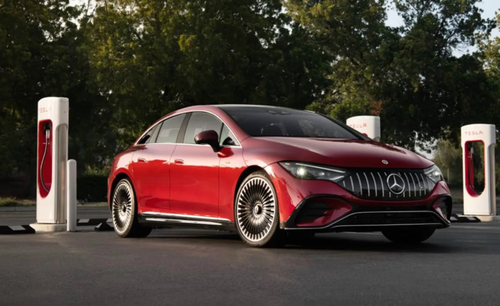
Mercedes-Benz is the first German automaker to announce the adoption of Tesla's North American Charging Standard (NACS). In 2024, Mercedes EV drivers can use Tesla's Supercharger network across North America. Then in 2025, all new Mercedes EVs will be equipped with NACS ports.
In addition to the more than 12,000 Tesla Superchargers in North America, Mercedes will also establish its own High-Power Charging Network with more than 400 Charging Hubs, including more than 2,500 high-power chargers, to ensure there are a sufficient number of chargers, as an increasing number of EVs are hitting roadways.
"Our strategic priority is clear: Building the world's most desirable cars. To accelerate the shift to electric vehicles, we are dedicated to elevating the entire EV-experience for our customers - including fast, convenient, and reliable charging solutions wherever their Mercedes-Benz takes them. That's why we are committed to building our global Mercedes-Benz High-Power Charging Network, with the first sites opening this year. In parallel, we are also implementing NACS in our vehicles, allowing drivers to access an expansive network of high-quality charging offerings in North America." Ola Källenius, Chairman of the Board of Management Mercedes-Benz Group AG, wrote in a statement.
Data from the US Department of Energy shows Tesla's Superchargers account for about 60% of all fast chargers in the US. The Biden administration has committed billions of dollars to expand the nationwide EV charging network.
Mercedes joins Ford, GM, Rivian, Volvo, and Polestar in recently announcing NACS adoption. That still leaves Volkswagen, BMW, Hyundai, Toyota, Honda, Stellantis, and Tata's Jaguar Land Rover, among other brands, to eventually announce the switch from Combined Charging System (CCS) to NACS. Several states, including Texas, Kentucky, and Washington, have mandated charging stations funded by the government must include NACS.
What's clear is that the EV space is attempting to standardize NACS to ensure reliability and convenience across all brands as a nationwide charging network is being expanded.
Maybe, in the next few years, EV owners won't have to carry an annoying bin of adapters as the charging network will be standardized with NACS. Tesla appears to be the big winner.
Mercedes-Benz is the first German automaker to announce the adoption of Tesla’s North American Charging Standard (NACS). In 2024, Mercedes EV drivers can use Tesla’s Supercharger network across North America. Then in 2025, all new Mercedes EVs will be equipped with NACS ports.
In addition to the more than 12,000 Tesla Superchargers in North America, Mercedes will also establish its own High-Power Charging Network with more than 400 Charging Hubs, including more than 2,500 high-power chargers, to ensure there are a sufficient number of chargers, as an increasing number of EVs are hitting roadways.
“Our strategic priority is clear: Building the world’s most desirable cars. To accelerate the shift to electric vehicles, we are dedicated to elevating the entire EV-experience for our customers – including fast, convenient, and reliable charging solutions wherever their Mercedes-Benz takes them. That’s why we are committed to building our global Mercedes-Benz High-Power Charging Network, with the first sites opening this year. In parallel, we are also implementing NACS in our vehicles, allowing drivers to access an expansive network of high-quality charging offerings in North America.” Ola Källenius, Chairman of the Board of Management Mercedes-Benz Group AG, wrote in a statement.
Data from the US Department of Energy shows Tesla’s Superchargers account for about 60% of all fast chargers in the US. The Biden administration has committed billions of dollars to expand the nationwide EV charging network.
Mercedes joins Ford, GM, Rivian, Volvo, and Polestar in recently announcing NACS adoption. That still leaves Volkswagen, BMW, Hyundai, Toyota, Honda, Stellantis, and Tata’s Jaguar Land Rover, among other brands, to eventually announce the switch from Combined Charging System (CCS) to NACS. Several states, including Texas, Kentucky, and Washington, have mandated charging stations funded by the government must include NACS.
What’s clear is that the EV space is attempting to standardize NACS to ensure reliability and convenience across all brands as a nationwide charging network is being expanded.
Maybe, in the next few years, EV owners won’t have to carry an annoying bin of adapters as the charging network will be standardized with NACS. Tesla appears to be the big winner.
Loading…






